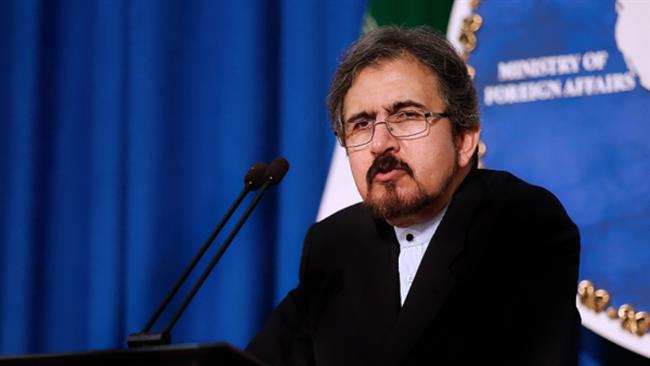PHOTO: Foreign Ministry’s Bahram Qassemi “Counter-terrorism should not be an excuse for violating territorial integrity”
LATEST
- Foreign Ministry: Accused Nuclear Negotiator is Not A Spy
- Growing Problem for Tehran Mayor Over Finances
Iran has finally criticized Turkey’s military intervention in northern Syria, expressing its concern over the support that has enabled rebels to take territory from both the Islamic State and Kurds-led forces.
Ankara’s sudden move last Wednesday — with air support, tanks, and special forces — for the rebels who crossed the border has put Iran in a quandary. Tehran has been courting Turkish President Recep Tayyip Erdoğan since a coup failed to depose him on July 15, hoping to end Ankara’s backing of the rebels to overthrow the Assad regime. Iranian officials, including Foreign Minister Mohammad Javad Zarif, have visited Turkey to talk about a political and military realignment.
However, the Turkish intervention has put the rebels in a stronger position, especially as rebel forces have also launched an offensive in northern Hama Province that has quickly taken more territory from the Syrian military (see separate entrySyria Daily, Sept 1: Rebels Take Another Town in Hama Offensive).
On Wednesday, Foreign Ministry Spokesman Bahram Ghassemi said Turkey’s move “complicates the regional situation”. While stating that “counter-terrorism efforts” — a reference to Ankara’s justification for the intervention — are important, Qassemi said, “[This] should not be an excuse for violating territorial integrity and conducting military operations in another country without the coordination of the central government.”
Qassemi also hit back at a quote from a British Foreign Office spokesman, cited by London’s Daily Mail, that Iran is “fostering instability in the Middle East”.
Qassemi said the remarks were “unrealistic and improper”:
Britain is expected to be well aware of Iran’s place in the Middle East and the situation in the region.
As a victim of terrorism, Iran has always been in the forefront of the fight against extremism and terrorism. The Islamic Republic of Iran is doing its utmost to help [establish] peace, stability and security in the region.
He claimed that Iran’s substantial and escalating military intervention in Syria — under pressure since the spring by rebel offensives that have overrun positions held by Iranian units and Iranian-led foreign militias — is “an advisory presence in Syria at the request of the legal government”.
Iranian media are reporting the death of another Revolutionary Guards general in action in Syria. Brig. Gen. Ahmad Gholami, a veteran of the Iran-Iraq War, was on the front southwest of Aleppo city where rebels have taken key positions this month.
An official with the Seyyed al Shohada Division, where Gholami was deputy commander, denied the death and said the general is in a coma.
Foreign Ministry: Accused Nuclear Negotiator is Not A Spy
The Foreign Ministry has again defended a member of the nuclear negotiating team who has been charged with espionage.
Hamid Baeidinejad, the Foreign Ministry’s director-general for political and international affairs, said accusations against Esfahani — who worked with Baeidinejad on the negotiations as a specialist on banking matters and sanctions — are “an insult to Iran’s intelligence and security apparatuses”, because they would have identified Esfahani as a spy sometime during his “20 years” of work in “sensitive international affairs”.
Baeidinejad also denied reports that Esfanhani is a dual Iranian-Canadian national, apparently to insulate him from a campaign by the Revolutionary Guards arresting dual nationals for supposed espionage.
Hardline sites began circulating accusations against Esfahani in June, forcing his removal as a director on the board of a leading bank, and he was detained last month and then released on bail.
Former MP Hamid Rasaei said that Esfahani had received “a monthly salary of $35 million” for passing information to US and British agencies.
See Iran Daily, Augusts 26: As In-Fighting Rises, Regime Arrests One of Its Nuclear Negotiators
Growing Problem for Tehran Mayor Over Finances
Tehran Mayor Mohammad-Baqer Qalibaf, a conservative candidate for President in 2005 and 2013, is facing a growing problem over calls for investigation of the municipal government’s finances.
Tehran City Council member Rahmatollah Hafezi has called on Parliament to investigate the provision of loans with exceptionally-low interest rates to Council members and senior officials on Qalibaf’s staff, as well as sales of government-owned property to them.
Qalibaf has written an open letter of protest to the Attorney General over a report from the judiciary-linked General Inspection Office that revealed his office’s involvement in the sales. The Mayor said the report is “distorted” and asserted that those who made the accusations against his office must be “decisively confronted” for damaging public trust in the political system if no crime is proven.

